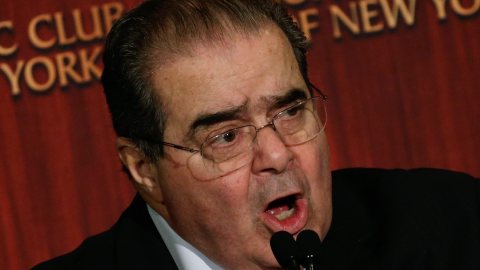Editorial: Scalia’s Country Had No Minorities
The late judge's doctrine is one of conservative activism disguised as objectivity.

Crédito: Archivo | EFE
The death of Supreme Court Justice Antonin Scalia has burst open a debate regarding the qualities his successor should have. There is a lot of talk, particularly in Republican circles close to the constitutional giant and within presidential campaigns. The candidates to the White House are promising to replace the deceased judge with someone who shares his philosophy if elected.
This is a call for Latinos to pay attention, as minorities basically do not exist in this interpretation of the Constitution. Scalia’s repeated decisions – colorful, provoking, offensive and pompous – consistently rejected any protections for vulnerable minority groups.
Scalia was the star of “originalism,” a doctrine that became popular in the 1980s in conservative legal circles. It came as a response to what used to be called “activist judges,” who made their decisions based on rights that did not exist in the Constitution. Scalia believed that the Constitution and its Amendments must be read precisely as they were written, and taking into account the intention of the authors who wrote it 226 years ago.
As a result, anything the Founding Fathers failed to keep in mind back in 1788 does not “exist” now or is not legal, whether it is affirmative action in any of its forms, or the Voting Rights Act, among others.
The decisions made by Scalia and fellow judge Clarence Thomas, who also shares this philosophy, showed that, behind the originalism argument, they hold a political ideology identical to that of the “activist judges” they criticize, minus the hypocrisy of calling themselves politically pure.
It is hard to think that the authors of the Constitution could, in all their wisdom, imagine today’s complex world with every one of its dilemmas pending solutions. That is why the most realistic legal perspective is the one that takes into account the Constitution as well as precedent cases and the potential impact of the decision. Some talk about an evolving Constitution able to apply basic principles to the realities of our day, tackling discrimination against African-Americans and Latinos by sustaining the idea of justice and today’s rights instead of the ones that existed in the distant past.
The appointment of Supreme Court justices is one of the president’s most important tasks. The reasonable thing to happen would be for President Obama to designate a replacement for Scalia. The Republicans’ opposition and their insistence on a pretentious legal philosophy is nothing more than the conservative wish for a country without neither discrimination nor minorities.




